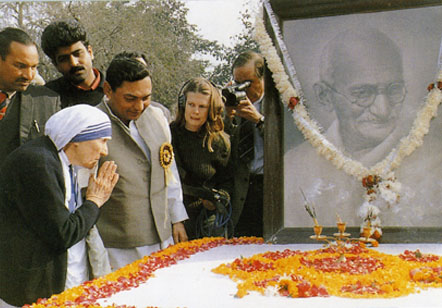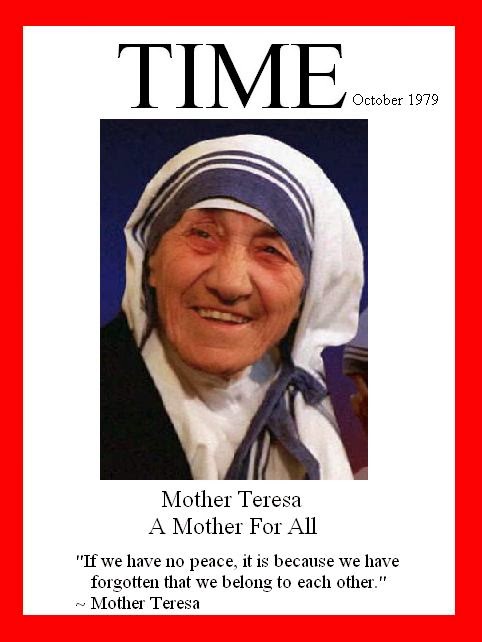
MOTHER THERESA was a remarkable woman. She performed heroic deeds of charity and often challenged the materialistic values of the West in interviews and speeches. Through her Missionaries of Charity in India, she fed the poor, nursed the sick and buried the dead by the tens of thousands.
Unfortunately, her works of charity do not mean she was saintly, in the Catholic sense. In fact, Mother Theresa, who died in 1997 and was canonized by “Pope” Francis this week, cannot reasonably be considered a Catholic saint. Mark Michael Zima, author of Mother Theresa: The Case for the Cause, wrote in 2007:
“Even though Mother Theresa said and did much that was Catholic, she also did say and do much that was not Catholic.”
Zima presented with eloquent clarity the case against her canonization, which was subsequently rejected by the apostates in Rome. (His book, which I highly recommend, is both an examination of Mother Theresa’s sanctity and a critique of the errors of modernism.) Zima wrote:
“Sincerity does not make the saint. Mother Theresa is not a saint based on her subjective sincerity or devotion to her conscience. Instead sainthood is based on the objective truth. Speaking from a holistic viewpoint, her words and deeds conflict with those of the saints, especially when her words and deeds are compared to the words and deeds of the saints of the Church in the Old and New Testament.”
Here are some of the statements Mother Theresa made:
“I do convert. I convert you to be a better Hindu, a better Catholic, Muslim, Jain or Buddhist.”
“Some call him Ishwar, some call him Allah, some simply God. But we all have to acknowledge that it is he who made us for greater things: to love and to be loved.”
“No color, no religion, no nationality should come between us. We are all children of God.”
On the face of it, these statements seem loving and unifying. They are inclusive. But they deny the very existence of objective truth. They promote relativism and a God who deceives. Where there is relativism, there is confusion and ultimately conflict. The globalists love chaos. It empowers them. That’s why I think of her as a New World Order saint, highly attractive to religious modernists as well because her example promotes:
* a fusion of East and West
* a new God
* a one-world religion
* relativism
* mass-produced celebrity holiness
* active virtues over the passive
While Mother Theresa abundantly provided for the physical and emotional needs of the poor whom she served, she did not always give them the light of truth, which is more important than food or medicine or a warm bed. The canonization of Mother Theresa is further evidence that Jorge Bergoglio is not a legitimate pontiff. He does not possess the Catholic faith.
Read more about Mother Theresa:
The “Canonization” of the Apostate Mother Teresa — Another Impossibility for a True Pope (Novus Ordo Watch)
What about the Orthodoxy of Mother Theresa? (Tradition in Action)
— Comments —
Bill R. writes:
In the Time Magazine cover quote, Mother Teresa says, “If we have no peace, it is because we have forgotten that we belong to each other.” You can always tell a liberal if they speak of peace not only as though it were something worth possessing unconditionally, but as though this unconditional peace were the ultimate goal of human endeavor. Only a fool could fail to see, and of those who see it, only a conscious deceiver fail to acknowledge, that such an endeavor, even if it existed, would be futile, since all life is struggle and strife, and all life faces predators of one kind or another, to say nothing of the intractable antagonist of human nature. And given human nature, those most likely to have the most “peace” (albeit only for the short run) are those most cowardly and least principled. Good, right, honor, and the courage to defend one’s own and those that one loves, I would rate far higher than any quest for peace, let along an unconditional and impossible one.
There is nothing wrong with the boundaries that separate humanity, be it into separate races, separate cultures, separate nations, and ultimately separate individuals. Rather, it is precisely those separations that give us our identity, and from that identity, our sense of place and purpose in this world. Mother Teresa was the one who had forgotten. One might have thought it would have occurred to her that even to be a Catholic, it is just as important to remember what that doesn’t mean, as what it does. And what it doesn’t mean are all the things that it is not, and therefore must reject, and therefore cannot belong to. And if there is something wrong with that, something wrong with separation, with belonging to some but not to others, why was she a Catholic at all? Why espouse any religion? Why not just be an areligious “Mother of All,” as Time described her? In other words, Mother Teresa forgot that it is precisely what separates us that gives us our only real sense of belonging, including her own, whether she knew it or not, and that it is not what separates us that deprives humanity of peace. What deprives humanity of peace is the willingness of others to violate the boundaries of that separation, and the sacred right and duty of those who have been violated to defend it.
Neil writes:
Years ago I read a biography of her by one of her sisters, Sister Nirmla. Sister Nirmla said that Mother Teresa encouraged her sisters to attend a Hindu Ashram.

